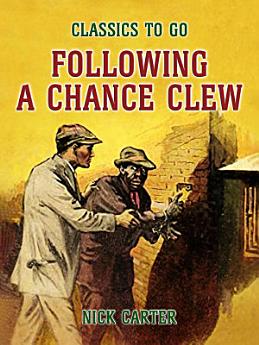Following a Chance Clew
Okt 2022 · Otbebookpublishing
E-Book
126
Seiten
family_home
Zulässig
info
reportBewertungen und Rezensionen werden nicht geprüft Weitere Informationen
Über dieses E-Book
Nick Carter read the sign over the jeweler's store on Eighth Avenue and stopped to glance critically at the place. He noticed that the "regulator" indicated midnight. His thoughts flew back to another midnight earlier in the week, when Lusker's store had been cleaned out by burglars. The robbery had been charged to a mysterious crook known as Doc Helstone, who was supposed to be the leader of a clever gang of lawbreakers. Nick had been asked to break up this gang, which had baffled some of the best men of Inspector McLaughlin's staff. A proposition had been made to him that day, and he had promised an answer on the morrow. Probably he would have decided to refuse the job, for he had a lot of work on hand; but, as he strolled up the avenue on that September night, an adventure was waiting for him which was to alter his purpose, and set him upon the track of a remarkable scoundrel."
Autoren-Profil
Nick Carter, a pseudonym for a collective of writers, emerged as a significant figure in the realm of dime novels and pulp fiction during the late 19th and early 20th centuries. The character of Nick Carter, a master detective, was created by Ormond G. Smith and John R. Coryell in 1886, and his adventures were penned by various authors, including Frederick Van Rensselaer Dey, who is often credited with shaping the character's enduring legacy.Carter's stories captivated readers with their blend of mystery, action, and clever detective work, making him one of the most popular fictional detectives of his time. His influence extended beyond literature, inspiring radio dramas, films, and comic books, thus cementing his place in popular culture.What intrigues modern readers about Nick Carter is the character's embodiment of the American spirit of ingenuity and justice during a transformative period in U.S. history. The stories often reflected contemporary societal issues, such as urban crime and the rise of modern investigative techniques, offering a window into the anxieties and aspirations of the era.Controversially, the Nick Carter series was sometimes criticized for its sensationalism and perceived moral ambiguity, sparking debates about the impact of pulp fiction on young readers. Despite this, the character's legacy endures, influencing contemporary writers and the detective genre as a whole.Nick Carter's revolutionary ideas included the use of forensic science and psychological profiling long before they became standard in real-life investigations, showcasing a forward-thinking approach that resonates with today's audiences. His adventures continue to be a testament to the enduring appeal of the detective genre and its capacity to evolve with the times.
Dieses E-Book bewerten
Deine Meinung ist gefragt!
Informationen zum Lesen
Smartphones und Tablets
Nachdem du die Google Play Bücher App für Android und iPad/iPhone installiert hast, wird diese automatisch mit deinem Konto synchronisiert, sodass du auch unterwegs online und offline lesen kannst.
Laptops und Computer
Im Webbrowser auf deinem Computer kannst du dir Hörbucher anhören, die du bei Google Play gekauft hast.
E-Reader und andere Geräte
Wenn du Bücher auf E-Ink-Geräten lesen möchtest, beispielsweise auf einem Kobo eReader, lade eine Datei herunter und übertrage sie auf dein Gerät. Eine ausführliche Anleitung zum Übertragen der Dateien auf unterstützte E-Reader findest du in der Hilfe.






